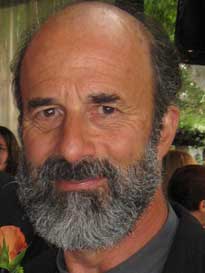|
Richard V. Sidy, M.Ed.
Throughout his life Richard Sidy has sought to improve
understanding between people and cultures. As an educator,
writer and activist he has sought to instill in people
a sense of optimism, the desire to work for peace and understanding,
and the motivation to help improve the lives of others.
Like many young people in the 1960’s
he had a great desire to discover how to live a life
that embodied spiritual values and social responsibility.
In 1971 he met Torkom
Saraydarian, whose dedication and personal example
of humanitarian work and creativity was a life-long inspiration. He gave
Sidy his first real push to write seriously by suggesting
the book World Diplomacy. He studied with Saraydarian until his
passing in 1997.
Sidy graduated from UCLA in 1968 with a BA in political
science, specializing in political theory, with minors
in Spanish and history. He was active in community service
projects including the Tutorial Project, the Experimental
College, and was the leader of UCLA Project Amigos for
which he organized and worked on development projects in
the barrios of Tijuana with other students each school
break.
In the spring of 1968 he was participating
in the Poor Peoples' Campaign when Martin Luther King
was assassinated. In the days after Kings death, he arrived
in Washington DC in the midst of an urban riot to work
with the Southern Christian Leadership Conference, King’s
organization. There he worked to prepare for the arrival
of poor peoples’ caravans
from all over the United States. He helped build, and then
lived in Resurrection City on the National Mall at the
feet of the Lincoln Memorial during the whole campaign.
His daily contact and participation with leaders and people
in this movement to raise political awareness of poverty
in America was an awakening for him.
After graduating from UCLA, Sidy entered the Peace Corps
in which he served for two and a half years in rural development
in the West African nation of the Ivory Coast. He lived
in the village of Sirasso and worked with the Senoufo who
were practicing animists, the Dyula who were practicing
Moslems and the Fulani who were nomadic herders of the
Sahel. This experience contributed tremendously to his
understanding of traditional agrarian peoples and religions,
the challenges of development, and the precarious survival
of a way of life and cultures in post-colonial Africa.
In the early 1970's, once again back in
Los Angeles, Sidy worked with Mayor Tom Bradley's newly
formed City Volunteer Corps. He was involved in starting
community gardens throughout the Los Angeles area and in
starting food co-ops in inner-city neighborhoods. Ever since that time he has been involved in organic gardening, and in encouraging local food systems. He is currently President of Gardens for Humanity.
Sidy earned his teaching
credential in secondary education at UCLA. He taught Spanish,
French, and Social Studies for the Los Angeles Unified
School District in south central Los Angeles beginning
in 1973, and in 1977 was selected to be on the founding
faculty of their first magnet school, the Center for Enriched
Studies. During this time he wrote and published curricula
for home-schooling families. In 1982 Sidy founded an innovative
elementary school in Sedona Arizona, emphasizing global
education, environmental studies, science, and art in an
integrated curriculum.
Sidy was one of twenty-three people from five nations
who met at the University
for Peace in Costa Rica, in April
1996, to brainstorm ways they could become instrumental
in raising the consciousness globally to focus on world
peace in the year 2000. The Honorable Rodrigo Carazo, former
President of Costa Rica, and Dr. Robert Muller, former
Under Secretary General of the United Nations and the Chancellor
of the University for Peace, were among those who worked
to construct the foundation for what they named the World
Peace 2000 Network. They produced an international declaration
of World Peace later adopted by the United Nations and
began creating a network of groups working for celebrations
of peace at the dawn of the new millennium.
Sidy earned his Master of Education degree
at Northern Arizona University in secondary education,
focusing upon international education, multicultural education,
and foreign language. He recently retired from teaching
French and Spanish with the Flagstaff Unified School District.
During his career he has organized and supervised
student cultural exchanges with France, the Ivory Coast,
and with the Navajo, Hopi, and Zuni people.
return to SNS Press Home Page
return to Teacher's Guide
return to top
|

